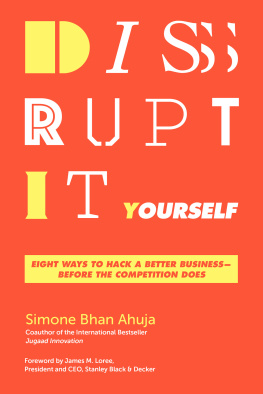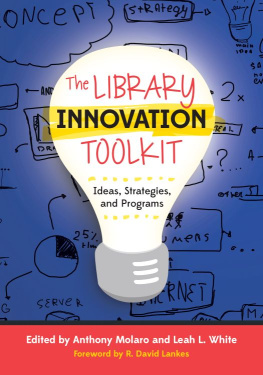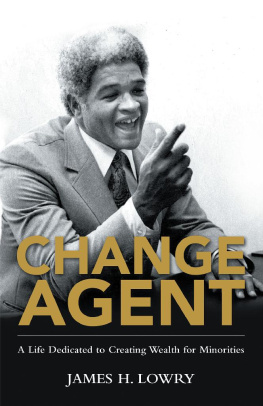Intrapreneurship Handbook for Librarians
Intrapreneurship Handbook for Librarians
How to Be a Change Agent in Your Library
Arne J. Almquist and
Sharon G. Almquist
Copyright 2017 Arne J. Almquist and Sharon G. Almquist
All rights reserved. No part of this publication may be reproduced, stored in a retrieval system, or transmitted, in any form or by any means, electronic, mechanical, photocopying, recording, or otherwise, except for the inclusion of brief quotations in a review, without prior permission in writing from the publisher.
Library of Congress Cataloging in Publication Control Number: 2016038372
ISBN: 978-1-61069-528-2
EISBN: 978-1-61069-529-9
21 20 19 18 17 1 2 3 4 5
This book is also available as an eBook.
Libraries Unlimited
An Imprint of ABC-CLIO, LLC
ABC-CLIO, LLC
130 Cremona Drive, P.O. Box 1911
Santa Barbara, California 93116-1911
www.abc-clio.com
This book is printed on acid-free paper 
Manufactured in the United States of America
Contents
Americans hold very favorable opinions of libraries and librarians. A Pew Research Center study in 2013 reported that 94 percent of those responding said that having a public library improves the quality of life in a community. Almost everyonemore than 90 percent in that same studyhas visited a library at some time and has developed a perception of what libraries are about. This perception rarely envisions librarians as change agents even though librarians of the 19th century created the worlds first true public library system. Librarians in the 20th century continued to build the public library system by innovating and making more services available. Their successors in the late 20th and early 21st centuries have used technology to revolutionize library services. Still, librarians are typically not recognized for fostering change, and libraries are not seen as institutions that have changed to keep pace with modern society.
In this book, the authors present the historical and contemporary case illustrating how librarians are indeed effective change agents, both within their libraries and within their communities. Within the change agent spirit, they explain the concept of intrapreneurship, provide examples of how intrapreneurship is taking place in libraries, and explain how all librarians can become intrapreneurs so that their actions may benefit libraries and communities.
The authors examine this topic from their experience in the field of librarianship and from their efforts as change agents and entrepreneurs. Sharon is an experienced instructor, having taught a wide range of library and information science topics to both graduates and undergraduates. She embraced distance learning models when they first became available and she has taught students across the country and in many lands using new technologies and new methods of instruction. She has studied entrepreneurship and managed a Media Library and established a multimedia lab that provided learning and experience for this research.
Arne has demonstrated intrapreneurship in his own library. As dean of the library at Northern Kentucky University, he has overseen a successful long-term effort to improve collections and services in the library. He has pioneered a new bachelor of science degree in library informatics to prepare students in Kentucky and other states for work in 21st-century libraries and other information-related fields. The partnership that he formed obtained two grants from the Institute of Museum and Library Services for training librarians and library staff members in Kentucky and West Virginia. This work has helped add professional librarians in rural and poor communities while educating many library staff members so that public libraries offer improved serviceoften using intrapreneurial ideas.
As State Librarian of Kentucky for the past nine years, I have seen firsthand the need for continued change using intrapreneurial concepts as described by the authors. The country's economic downturn in 2008 has resulted in many challenges for libraries. Like libraries in many states, Kentucky library budgets remain stagnant while the need for services continues to increase. Resources to support services for the public have become scarcer so decisions on where to make investments in service have become vital.
Kentucky's public libraries have proven to be good laboratories and learning spaces for the concepts suggested in this work. With new technologies available, library materials abundant, and staff who are open to new ideas, opportunities for positive change abound. I am gratified that the authors have chosen to highlight intrapreneurial libraries and librarians and hope that the examples will encourage libraries everywhere to embrace practices that foster effective and sustainable change.
Even though the public may not view librarians as change agents, librarians have made many changes through the years in order to surviveand particularly to thrive. Using the framework described here by the authors provides a route for continued change in order to improve services and meet the changing needs of communities. Twenty-first-century librarians would be well advised to study this book and incorporate its principles into action steps for their libraries.
Wayne Onkst,
State Librarian, Kentucky
Wayne Onkst served as state librarian and commissioner of the Kentucky Department for Libraries and Archives from 2006 until his retirement in 2015.
For many years the authors have been engaged in entrepreneurial efforts within and outside of their libraries without necessarily labeling themselves intrapreneurs . Arne, at the University of North Texas and Northern Kentucky University, worked to create an infrastructure to support and foster programs and projects and built a wide-ranging network to help leverage their impact. Sharon, in her role as head of the Media Library at the University of North Texas Libraries, constantly sought out new opportunities, such as her creation of the Multimedia Development Lab, which crafted interactive multimedia kiosks for the campus community in a pre-Internet environment. Currently, she is completing classes at Northern Kentucky University's Haile/US Bank College of Business toward an entrepreneurship certificate.
With decreasing levels of funding and increased competition, it is clear that there is a need for librarians to look at new and innovative ways of increasing impact, growing resources, and developing new ways of leveraging the unique skills and perspectives of librarianship to ensure that libraries are able to survive and grow. As managers, we encouraged, empowered, and supported our staff to expand their efforts, be creative, and to feel comfortable when suggesting change and innovation. Engaged in community service and outreach, we are dedicated Rotarians who fully embrace the Rotary mantra of "service above self" and are comfortable building and participating in partnerships that incorporate organizations of varying types and missions.
Like us, many of you are undoubtedly already intrapreneurs without realizing it. Whether you have changed an outmoded internal procedure, created innovative new programs to better serve your community, introduced fee-based programs to grow revenues, created or joined nontraditional partnerships to provide new services and reach new audiences, developed new technological innovations, or taken a chance (a calculated risk) and presented an idea for improvement, you have already displayed intrepreneurial instincts. Some of you may even be accidental intrapreneurs by becoming change agents without intending to do so because you saw a need and opportunity and took action.













